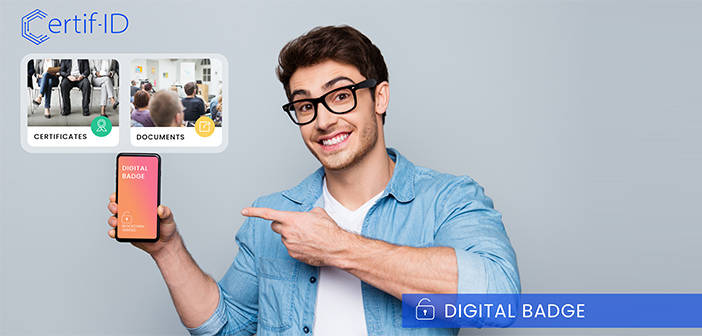To start with, let us understand what digital badges are.
A digital badge, or an e-badge, validates an individual’s accomplishments, certifications and skills earned from different educational and training institutes. Digital badges can also be issued to individuals after the successful completion of an internship.
Since digital badges, digital credentials and digital certificates are closely related, most people are often confused about them. A digital credential is a form of digital evidence with which third-party certificates an individual’s course completion and skills acquisition. A digital badge is an image representing a digital credential, which is used as a means for information transfer. Digital certificates are a part of the digital credential bracket and are defined as a digital equivalent of paper certificates.
In the educational sector, a student can earn a digital badge after completion of a course or acquisition of a skill. Educational and training institutes should consider using digital badges to make their students showcase their skills for better visibility in the job market.
Digital badges are multi-purpose in nature. These badges can be assigned to social profiles, online resumes and HR records.
Some benefits of earning digital badges for specialized training and experience include:
- Certification: Show potential recruiters that an individual has relevant skills.
- Validation: Verify an individual’s participation in a training program or workshop on his/her CV or resume.
- Transparency: Potential employers can gather key details regarding the content of the training and experience.
Also read: Blockchain technology: The hub that the Indian Edtech sector needs – More here: https://nationalskillsnetwork.in/blockchain-technology-the-hub-that-the-indian-edtech-sector-needs/
 Why should educational institutes use digital badges?
Why should educational institutes use digital badges?
Educational and training institutes should consider using digital badges because of the following:
Skill-based learning: Digital badges enable students to show that they have acquired relevant skills useful for a specific job. A digital badge should be linked with professional competencies to ensure that it is valuable to the students. Digital credential programs issue digital badges from technical skills, like search engine optimization, to soft skills, like non-profit leadership, and everything in between.
Personalized learning: Micro-credentials divide subject matter into specified skills, which enables education and training institutes and students to tailor their education plans as per their needs. For instance, Digital Promise is a digital credential company that provides various professional development badges to teachers by different issuing organizations. Having several issuing bodies on board allows the teachers to find options based on their requirements. Another feature of digital credentials related to personalized learning is that a learner has the option of completing the course anytime and anywhere and earn a digital badge.
Open standards: Digital badges are portable and verifiable in nature and offer students the chance to move away from a traditional course at an educational institution. There are different platforms, like the IMS Comprehensive Learner Record, that allow for an extension on transcripts to include achievements and competencies that a student did not obtain from a typical classroom. These achievements follow the student to the workplace, which links his/her academic career with specific skills that recruiters are looking for.
When an educational institute focuses on improving the overall student experience, it will be in a position to attract more students to the campus. The way digital badges connect education with the workplace is likely to have a profound impact on the way how students plan their futures, both inside and outside of the classroom.
Certif-ID is among the pioneers to help educational and training institutes in adopting digital credentialing. Educational institutes can collaborate with Certif-ID and issue digital certificates to the graduates. The digital certificates issued on the Certif-ID platform are hundred-per cent secure and verifiable in nature, as they are based on blockchain technology. This technology creates an unalterable link between the institution issuing the certificate and the graduate receiving it.
Educational institutes can also list courses, create and manage batches on the platform. Post the course, students can be issued certificates directly on their Certif-ID profile and email.
Digital badges have huge potential to be the next big thing in the digital credential area apart from offering a wide range of benefits. Educational and training institutes should consider issuing digital certificates to the students to empower them with employable skills and be job-ready.
To know more about how Certif-ID can help your institute issue digital certificates to your graduates, please feel free to book a demo or write to us here.












